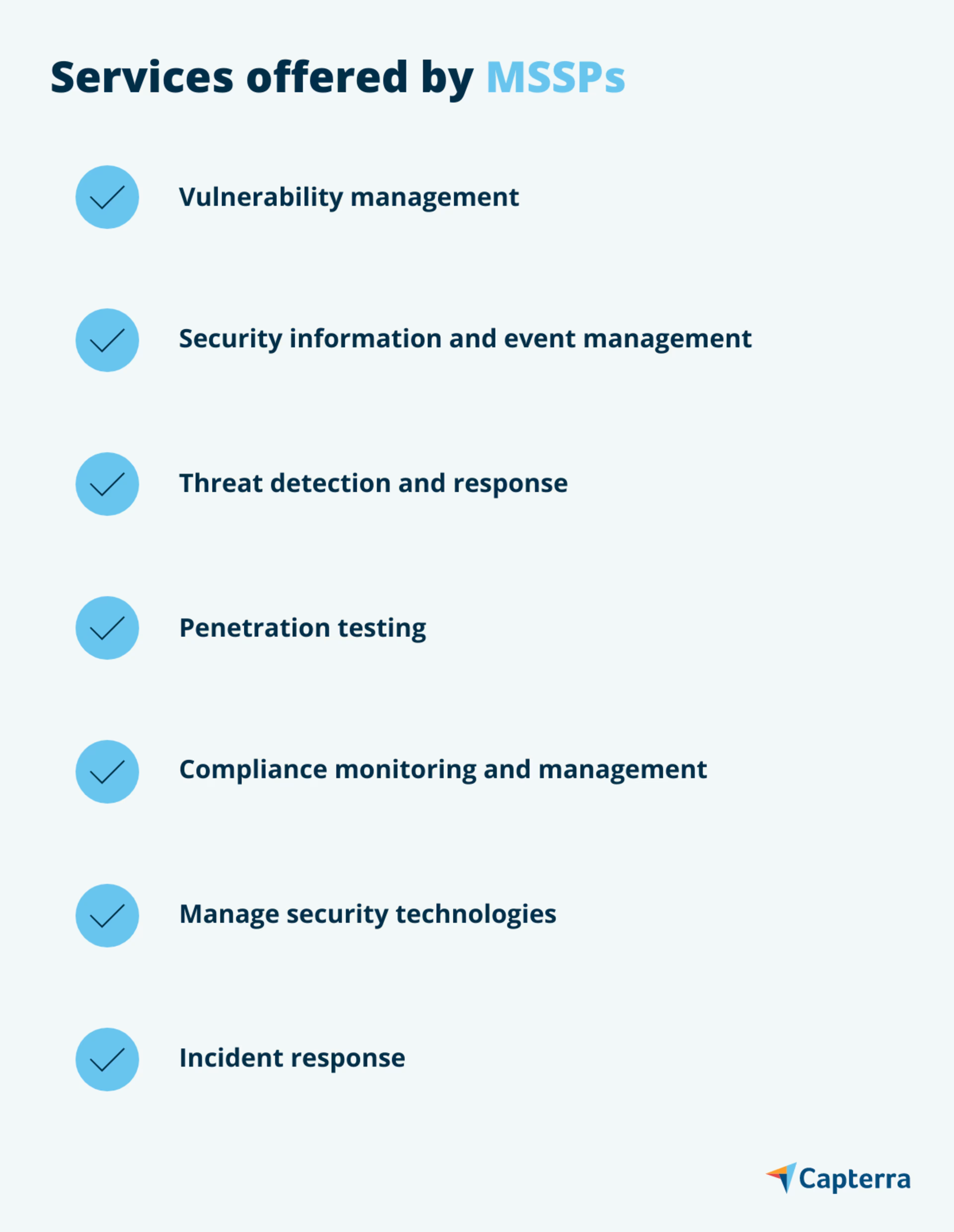Choose the right MSSP provider by knowing what to look for.
Small to midsize business (SMB) leaders regularly look for ways to save time and money on their IT needs. At the same time, they need to improve their IT capabilities. This can be a challenge because they may not have the resources to hire in-house IT staff. In addition, the process of monitoring and managing security devices and systems can be time-consuming and expensive.
For many decision-makers, an increasingly popular solution is to hire a managed security services provider (MSSP). In fact, according to Gartner, in 2022, the managed security services market grew 15.8%, reaching $16.98 billion in revenue.[1]
But despite this growing number of options, choosing the right provider is difficult, especially without knowing the roles they can play and what to look for as you compare your options. This is your guide to choosing the right MSSP for your business, understanding what they do, and how they can help your business.
What is MSSP?
A managed security services provider (MSSP) provides your business with security services, such as vulnerability detection, network monitoring and management, and threat detection and response. You can hire a provider to cover a specific element of your cybersecurity or, depending on your network architecture, handle 100% of your security.
Hiring an MSSP can be cost-effective and save valuable time for an SMB. For one, you do not need to hire more internal IT staff to take on these responsibilities nor do you need to provide security training for your existing team. Your MSSP also handles staying up-to-date with the latest technology and security tools to safeguard your business.
In addition, the MSSP team can provide customized security, specifically designed to meet the needs of your industry. This kind of industry-specific service is becoming increasingly popular as Gartner has found that developing industry-specific MSS offerings is one of the most common innovation areas for MSSPs.[]
If this trend continues, it will be increasingly easy to find an MSSP that understands the unique security needs of your sector.
What services do MSSPs offer?
An MSSP can do much of what an in-house team can do, with relatively few exceptions.

Vulnerability management
An MSSP can design a vulnerability management system that is customized to protect your network and data. For instance, some devices may have open ports that hackers can exploit remotely. Other networks may have web apps that employees access remotely using inadequate passwords or no multi-factor authentication to protect their credentials. Some companies depend on web portals that may be susceptible to distributed denial of service (DDoS) attacks designed to overwhelm their servers and force outages.
Carefully catered vulnerability management services have emerged as a subset of MSSP services. As Gartner explains, some service providers have developed a separate offering, referring to it as vulnerability management as a service (VMaaS). Others offer the same provision but prefer to use the term “attack surface management services.” [3]
Security information and event management
What is an MSSP from the perspective of managing cyber events? They can serve as your frontline defense system by collecting and managing security data and events.
MSSP services can collect data from your network and determine which threats are most likely to impact your business. Then, when an attack occurs, your provider can analyze event data and organize the most effective response.
Threat detection and response
An MSSP can also set up a threat detection and response system to protect your data and network. A threat detection system pinpoints incoming attacks so your MSSP can either use software or a cybersecurity professional to respond to the attack.
For example, suppose an attacker tries to steal sensitive business documents, videos, and images from a database. Your MSSP can set up a system that monitors the rate at which data leaves your network. When the system detects a large amount of data streaming out, it can automatically shut down that network segment’s connection to the internet. This immediately stops the attack, giving your team time to address the issue.
Penetration testing
The typical managed security service provider definition also includes white hat hackers or penetration testers. Penetration testing involves assessing your network’s potential vulnerabilities and then systematically attacking them. You, the business owner, always control which areas of your network your MSSP tests and the amount of time they launch the attacks.
After your MSSP has completed the testing, they issue a report regarding your vulnerabilities and ways you can improve your defenses.
Compliance monitoring and management
MSSPs are especially useful when it comes to monitoring your network for compliance issues. A qualified MSSP will be familiar with the compliance concerns that your company may have to deal with—as well as effective ways to address them.
For example, let’s say you’re in charge of IT for a hospital, and you have to comply with the HIPAA regulations. Specifically, you need to make sure patient data is encrypted and stored per rules around securing personally identifiable information. If you hire the right MSSP, they will understand the kind of encryption you need, have the encryption technology you need, and know the best ways to store patient data in ways that align with HIPAA standards.
Manage security technologies
An MSSP understands how to use a variety of security technologies to protect your network, as well as how to configure them and optimize their performance. Given the range of security tools available, this can be a powerful asset.
To illustrate, suppose you have a next-generation firewall, which can detect threats based on their behavior instead of just their signatures. Your MSSP will understand how to configure your firewall to detect the kinds of behavior that could indicate an attack. For example, a seemingly innocent file may start to move laterally through your network. Your MSSP can set up firewalls between different network segments and make sure they can detect this kind of activity.
MSSPs can also leverage the following technologies to protect your environment:
Intrusion prevention systems: These detect attempts to infiltrate your network and stop them before they can damage your system.
Web content filtering: An MSSP can prevent your employees from downloading or viewing certain types of web content
Identity access management: An MSSP ensures that only authorized users interact with your system by managing access to your network.
Privileged access management: Using privileged access management, your MSSP can designate access to specific areas of your network only to certain people. This may involve using a VPN and implementing zero-trust network access principles.
Patch management: An MSSP can ensure that you have the most recent patches and updates to prevent attackers from penetrating your system.
Anti-virus and anti-spam software. These technologies detect and stop viruses and spam by quarantining malicious files and putting spam in appropriate folders.
Incident response
In some cases when there’s an incident, such as a denial of service attack, your MSSP can address it without having to take up any of your time or energy. In other cases, your MSSP can perform forensics to determine the cause of the incident and isolate the vulnerabilities that may have been exploited. Your MSSP can also provide training to your employees on how to avoid these issues in the future.
Why do businesses hire managed security service providers?
Businesses hire managed security service providers because it saves time and money while also giving the company the latest security technology. In some cases, a company can outsource the vast majority of its security to its MSSP. As a result, the company’s IT team can use its time and energy to tackle other business-critical projects.
It’s also common for companies to use an MSSP to manage routine and mundane, yet important security tasks that would otherwise consume too much of their IT team’s schedule.
MSP vs. MSSP
A managed service provider (MSP) provides general IT services, while an MSSP provides security-specific services. To find the most qualified MSP software and companies, you can use our software directory and MSP agency directory.
What do you look for when choosing an MSSP?
Choosing an MSSP comes down to aligning its capabilities with your security needs. You can use the following criteria:
Expertise and experience
The right MSSP should have years of experience handling your type of network environment. It’s also a plus if they have expertise when it comes to protecting businesses in your specific sector.
Services offered and cost
The range of services and their price tag should match your requirements. For instance, some companies need a full range of cloud-hosted security services, while others may only need network monitoring.
Technology familiarity
A qualified MSSP should be familiar with the technology needed to protect your specific environment. For example, if you have a web app, your MSSP should know how to work with the latest web application firewalls.
Communication and support
An MSSP needs to be able to communicate with your point people in a way that’s convenient for them and fits their work schedules. If there’s a need for support, you need to evaluate the levels of support the MSSP offers and any additional costs this may involve.
Scalability and flexibility
Your MSSP should be able to handle any scaling initiatives, such as adding more employees during busy or holiday seasons. Also, they should be able to adjust to any changes in your network or endpoints.
Customer reviews
Customer reviews can be a valuable source of information because they give you insight into how the company has served customers in the past. Pay attention to any complaints regarding the quality of the MSSP’s services, reliability, and communication.
Budget
An MSSP’s services may be affordable initially but then climb beyond your budget, especially if you have to expand the services they offer. When designing your budget, consider what your IT environment will look like in both the short and long term.
Leverage an MSSP to strengthen your security
You can use this guide to decide the kinds of services you can use an MSSP for and the traits to look for as you vet your options. Your next step is to start evaluating IT service agencies and IT management software. These resources can help you get started:
